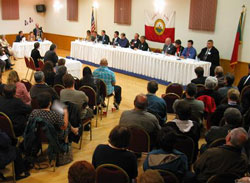In this section
Resources
| These samples are from previous Candidates' Nights. Feel free to download them and use them as a resource when hosting your local candidates' night. | |
| Brochure: Tips for Planning and Conducting Candidate Forums | |
| Sample Format & Guidelines | |
| Sample Forum Questions, New Bedford, MA, October 2007 |
|
| Sample Candidates' Night Questions | |
| Sample Candidates' Night Report | |
Sample Letters
Letters to New Bedford City Council, June 2007 |
|
| Letter to David Alves |
|
| Letter to Brian Gomes |
|
| Debora Coelho |
|
| Letter to Denis Lawrence |
|
| Letter Jane Goncalves |
|
| Letter to John Saunders |
|
| Letter to Leo Pimental |
|
Conducting a Candidates’ Night
 Hosting a candidates’ night is a complement to the get-out-the-vote initiatives and registration drives also conducted by the Project. Candidates' nights create well informed citizens, allowing them to make the most use of their voting power.
Hosting a candidates’ night is a complement to the get-out-the-vote initiatives and registration drives also conducted by the Project. Candidates' nights create well informed citizens, allowing them to make the most use of their voting power.
To stage a candidates’ night,” first, determine which political office you wish to focus upon. For example, the school committee, the city council, the mayor, state or federal officials. (Generally the lower the political office, the greater the impact of a candidates’ forum. School committee candidates would be more responsive to a community’s invitation than congressional candidates.)
Next, determine the timing for the event. In some areas, a candidates’ night after the first primary eliminates casual candidates and leaves only serious contenders. In other areas with one dominant political party, a forum should be staged before the primary election if, after the primary election, there would be no meaningful contest. Once the time is decided, the organizers must send invitations as soon as possible to all candidates for the office in question to get the event on everyone’s campaign calendar.
Once the political office and timing decisions are made, a committee must be organized to determine the key questions to put before the candidates. Experience has shown that focusing on four or five key points leaves the candidates with a clear understanding of the community’s concerns.
Finally, record the entire proceedings for later review. Committee members should document each and every promise made by the candidates.
Once the elections are over, a letter should be sent to each successful candidate congratulating him or her on their win and requesting an appointment midway through their term of office. The committee can then use the notes from the candidates’ night to review each political office holder’s progress in fulfilling his/her campaign pledges.
